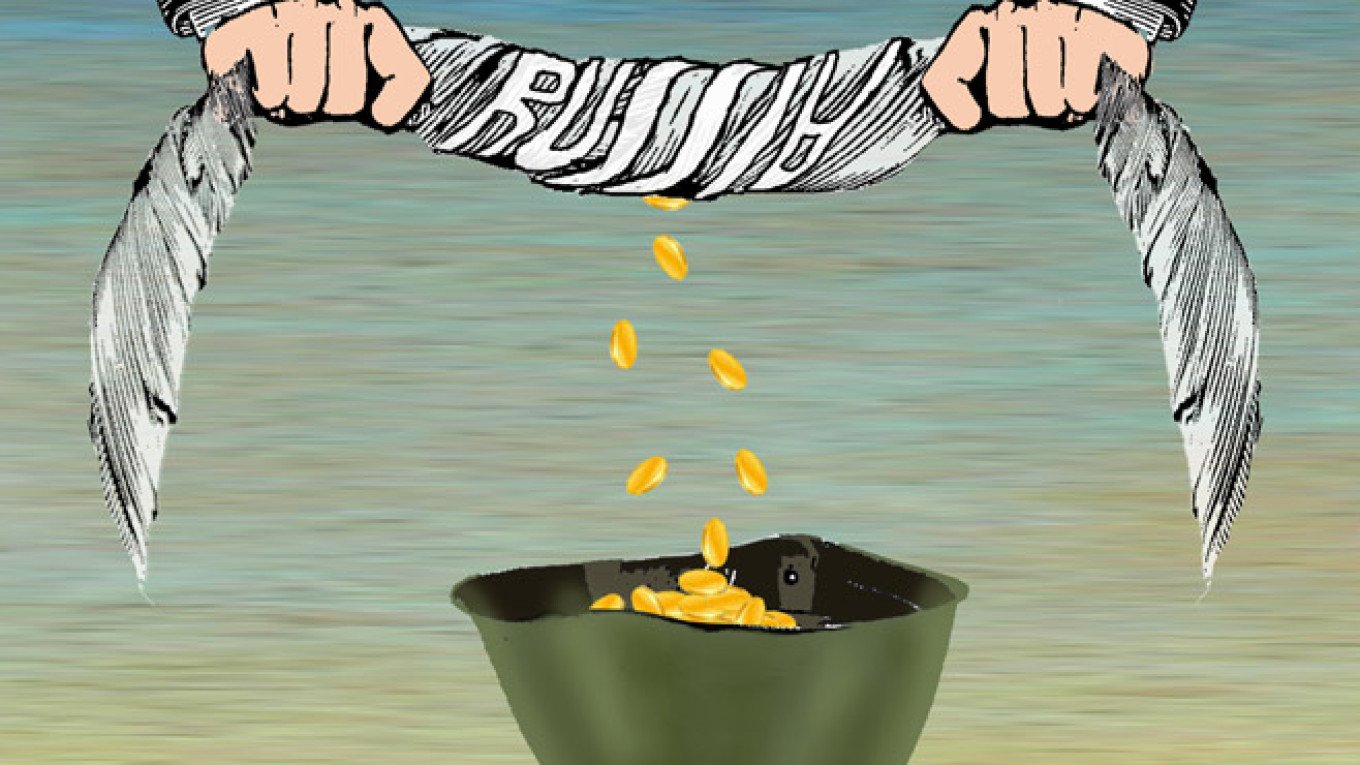No doubt NATO defense ministers will turn green with envy if they catch wind of an interview that State Duma defense committee chairman Admiral Vladimir Komoyedov recently gave.
Whereas the ministers must fight tooth and nail to squeeze money out of their parliaments — and only barely managed during the recent NATO summit in Wales to secure a promise from their leaders to increase military spending by just 2 percent — Komoyedov claims that Russia will spend a record 3.3 trillion rubles (more than $80 billion) on its military next year.
That represents 4.2 percent of Russia's gross domestic product. It is also $19 billion more than the military received last year. According to Komoyedov, "These are significantly higher figures than 2014, when military spending accounted for 3.4 percent of GDP, 3.2 percent in 2013 and 3 percent in 2012."
He added that the State Duma defense committee had "already given its support to the draft of the federal budget." Obviously, poorer countries like France or the Netherlands cannot afford such extravagance, but it is a simple matter for the great and prosperous Russia — a country with money to burn, a country with such an overabundance of wealth that it shut down three dozen hospitals in its capital city and fired 7,000 medical workers.
Moscow has decided to boost military spending by 25 percent even as falling oil prices and a weakening ruble deliver a catastrophic blow to the national budget. Finance Minister Anton Siluanov very recently plucked up his courage and encroached on President Vladimir Putin's sacred cow of defense spending.
"At present we simply cannot afford this and will work with the Defense Ministry to determine which expenses the budget can finance," he said.
Deputy Defense Minister Yury Borisov immediately shot back with the claim that Russian industry is prepared to fulfill the government's "ambitious plan," and that any media reports to the contrary should not serve as a pretext for "reducing obligations and the level of financing."
According to Komoyedov, the top brass will not use the additional funds to maintain or improve conditions for troops or for hiring new contract soldiers. "The public part of funding for the armed forces' operational costs in 2015 will total only 807 billion rubles [$20 billion], down 61 billion rubles [$1.5 billion] from 2014," he said. "In 2016 and 2017, spending will total 844 billion rubles [$21 billion] and 770 billion rubles [$19 billion] respectively."
Komoyedov told Duma deputies that in 2015 the money would primarily go toward upgrading existing weapons and for "new models of weapons and military and specialized equipment."
Of course, this is no accident. Close Putin associates already hold control over all of Russia's major assets, including the production of oil, gas and steel.
But when officials announced in 2011 that the government would spend 23 trillion rubles ($564 billion at today's exchange rate) on rearming the military, they put a huge new piece of the budgetary pie up for grabs.
I suspect that the real reason former Defense Minister Anatoly Serdyukov was dismissed is that he interfered with the distribution of that money between the "right people." And now, despite the country's economic crisis, Putin's desire to confront the insidious West creates an opportunity for his associates to pocket a few more billion dollars.
The problem is that much of that money will be wasted due to structural problems, Russia's inability to restore cooperative defense industry ties that existed during Soviet times, an aging workforce and the fact that most of the money allocated for weapons production inevitably disappears into countless obsolete state factories or winds up as luxurious personal palaces in Crimea and Sochi.
However, Putin ignored the warnings of his finance minister in favor of not only expanding his military, but also of pumping more money into the pockets of his core electorate: defense factory employees. Putin's associates now plan to get even richer from this new windfall, but the irony is that their insatiable greed drives them to empty out the very state coffers that supply them with all of their wealth. It would seem that Russia's top finance official lost this back-room battle.
A leader who tells his citizens that he will increase military spending amid an economic crisis is like an alcoholic father who, upon learning that the price of vodka has gone up, tells his children not that he will drink less, but that they will now have to eat less.
Alexander Golts is deputy editor of the online newspaper Yezhednevny Zhurnal.
A Message from The Moscow Times:
Dear readers,
We are facing unprecedented challenges. Russia's Prosecutor General's Office has designated The Moscow Times as an "undesirable" organization, criminalizing our work and putting our staff at risk of prosecution. This follows our earlier unjust labeling as a "foreign agent."
These actions are direct attempts to silence independent journalism in Russia. The authorities claim our work "discredits the decisions of the Russian leadership." We see things differently: we strive to provide accurate, unbiased reporting on Russia.
We, the journalists of The Moscow Times, refuse to be silenced. But to continue our work, we need your help.
Your support, no matter how small, makes a world of difference. If you can, please support us monthly starting from just $2. It's quick to set up, and every contribution makes a significant impact.
By supporting The Moscow Times, you're defending open, independent journalism in the face of repression. Thank you for standing with us.
Remind me later.


